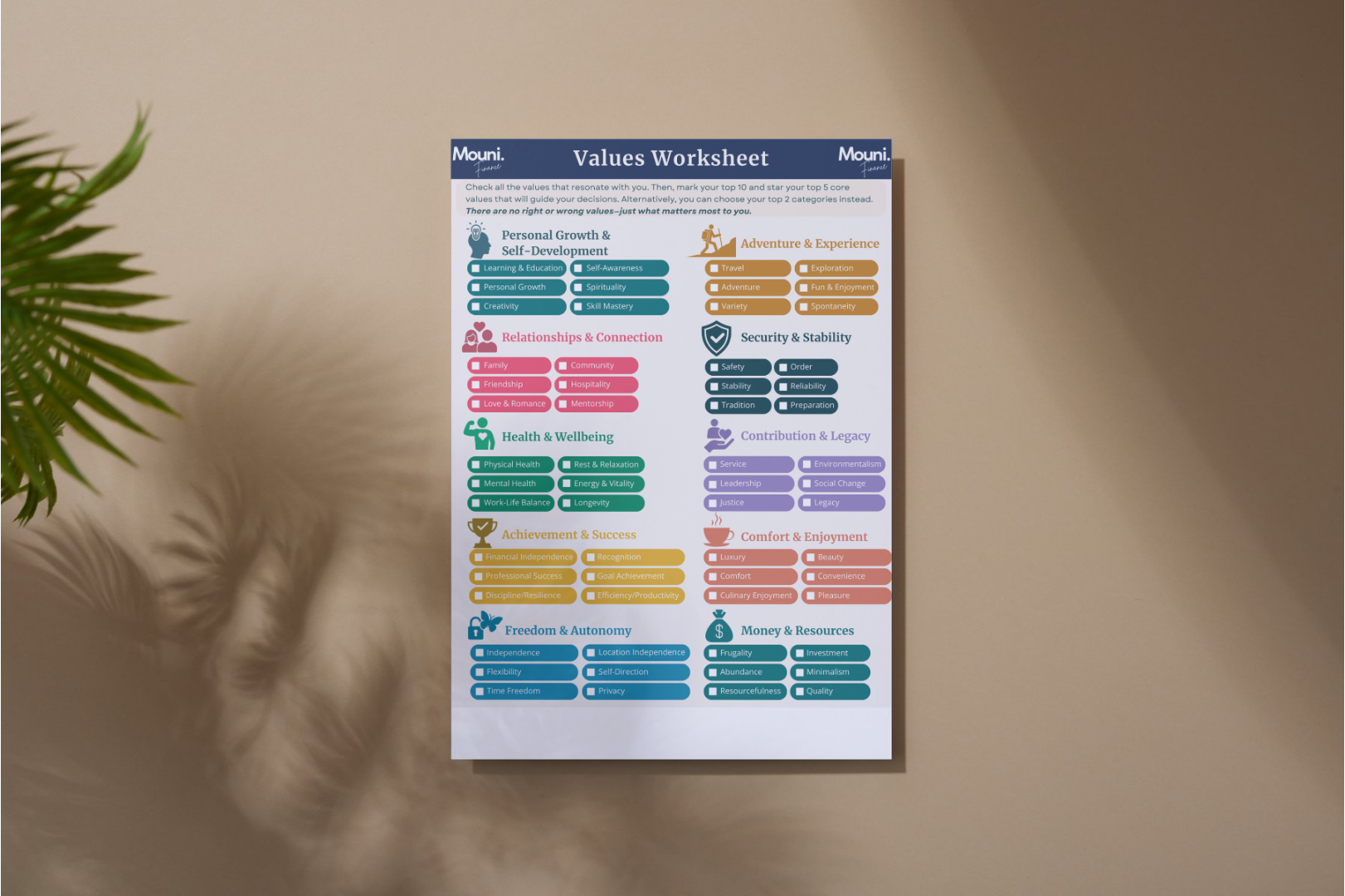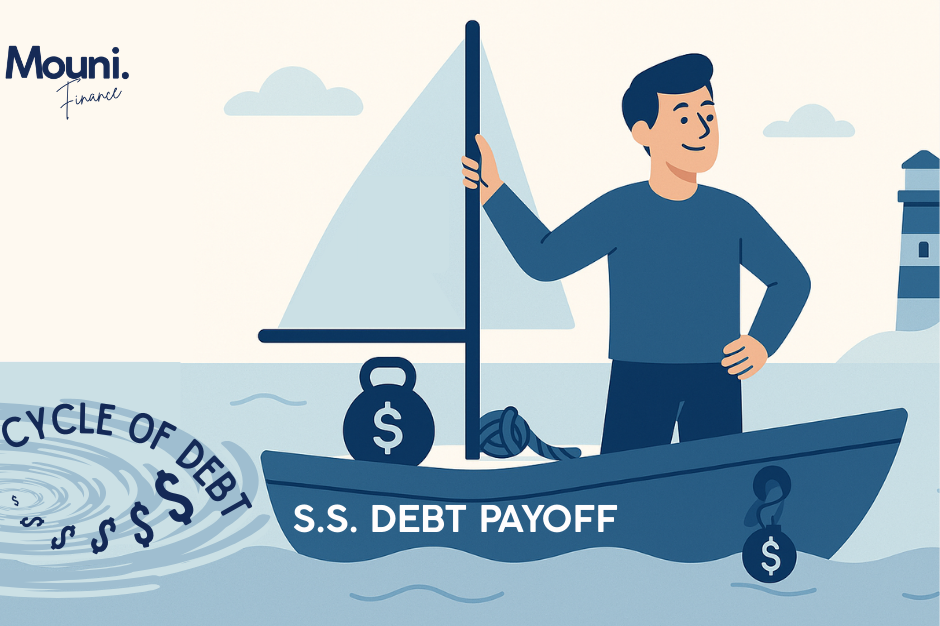🧭 Do Your Finances Reflect What You Value? Why Values Clarification Is the Missing Step in Money Management
🧭 Do Your Finances Reflect What You Value? Why Values Clarification Is the Missing Step in Money Management

When people come to me for financial coaching—or sit across from me in the therapy room—there’s often a similar feeling underneath the surface:
“I’m trying so hard with money, but it still feels stressful. I can’t seem to stick to my goals. Something just feels…off.”
More often than not, the issue isn’t the numbers themselves or the other problems people come into the room with. It’s a lack of clarity about values.
Money management isn’t just about math. It’s about meaning.
And if your financial habits aren’t aligned with what truly matters to you, even the most “responsible” budget will feel empty, restrictive, or unsustainable.
What I Mean by “Values”
In Acceptance and Commitment Therapy (ACT), values are not goals.
- Goals can be completed: “Pay off my credit card,” “Save $10,000,” “Buy a house.”
- Values are ongoing directions: “Financial freedom,” “Security,” “Generosity,” “Adventure.”
A goal is a milestone. A value is the compass that tells you which direction to walk in.
When we clarify values, we’re not just making a to-do list. We’re identifying what gives life depth, vitality, and purpose—so that our financial actions become expressions of who we are.

Why Values Clarification Matters in Money Management
Without clarity, it’s easy to:
- Overspend on things that don’t fulfill you. (The shiny purchase feels good in the moment, but quickly fades.)
- Feel guilty even when you can afford something. (Because you’re not sure if it “fits” your priorities.)
- Chase goals that don’t actually belong to you. (Working toward someone else’s version of success.)
- Make reactive choices. (Buying, saving, or cutting impulsively instead of intentionally.)
When you do know your values, money stops being just numbers. It becomes a tool:
- To build stability where you need it most.
- To invest in the people and experiences that matter to you.
- To reduce guilt and second-guessing.
- To give your financial plan a sense of direction, not just rules.
Values = clarity. And clarity = calm.
A Simple Tool: The Values Clarification Worksheet
This is a tool I use with both financial coaching clients and therapy clients when they feel stuck.
Here’s how it works:
- Scan the list of values.
- Check off all the words that resonate.
- Narrow down to 10.
- Star your top 5.
It sounds simple, but it’s powerful. The act of choosing forces you to wrestle with tough questions:
- “What matters most to me?”
- “If I could only prioritize a handful of things, what would I choose?”
- “Where do I want my money, time, and energy to consistently flow?”
💡 Important: Just because something doesn’t make your top 5 doesn’t mean it’s unimportant. It just means you’re honing in on the core drivers—the values that shape other values.

5 Reflection Questions to Deepen the Practice
Once you’ve clarified your top values, ask yourself:
- How are my current spending habits supporting or contradicting each of these values?
- What financial goals would best align with my core values?
- Where might I need to reallocate spending to reflect them better?
- What financial decisions have felt “off” recently—and how did they conflict with my values?
- Do the people closest to me know what I value most—and are we supporting each other in living it out?
These questions help connect the dots between your values and your day-to-day money choices.
ACT in Action: Values vs. Avoidance
In ACT, one of the biggest traps we talk about is experiential avoidance—trying to escape discomfort instead of moving toward what matters.
This shows up in money all the time:
- Swiping a credit card to avoid feeling left out.
- Avoiding looking at your budget because it feels overwhelming.
- Buying something new to escape boredom or stress.
Clarifying values gives you an anchor. Instead of asking, “What makes me feel better right now?” you start asking:
👉 “What choice moves me closer to the life I want to build?”
That shift—from avoidance to committed action—is what turns financial stress into financial confidence.
Case Study: Values in Real Life
Let’s imagine two people with the same income and the same debt.
- Taylor hasn’t clarified values. They save sporadically (For what, who knows?), spend reactively, and feel guilty no matter what. Money feels like a constant source of shame, especially as they live paycheck to paycheck.
- Jordan has clarified values. Their top values are Family, Health, Adventure, Stability, and Growth. They:
- Budget for family trips without guilt.
- Prioritize healthy food even when it’s not the cheapest.
- Save for an emergency fund to protect stability.
- Cut back on purchases that don’t reflect their top 5.
Same numbers, different outcomes. Why? Because Jordan knows what money is for.
How to Start Reorienting Your Finances Around Values
- Clarify – Use the worksheet to name your top 5 values.
- Assess – Look at your last month of spending. Where did your money align—or not align?
- Realign – Pick one category to adjust this month (ex: cut impulse shopping, redirect to travel fund).
- Commit – Set up a small, consistent action that reflects your values (ex: automatic transfer to savings labeled “Adventure Fund”).
- Review & Rebalance – Revisit your values 1–2x a year. Life shifts, and so will your priorities.

Final Thought: A Compass for Calm Finances
At Mouni Finance, I believe values clarity is the foundation of financial wellness. It’s the compass that points you toward the life you actually want, not the one others expect of you.
So ask yourself:
👉 Do my finances reflect what I value most?
If the answer is unclear, don’t see that as failure. See it as an invitation—to clarify, realign, and move forward with calm confidence.
Your Next Step
✅ Download your free Values Clarification Worksheet
💬 Journal through the reflection questions
📅 Want guidance?
Book a free 15-minute exploration call and let’s align your money with your values.
Because when your finances reflect your deepest values, money stops being a source of shame—and starts becoming a source of peace.
To clearer values and calmer finances,



